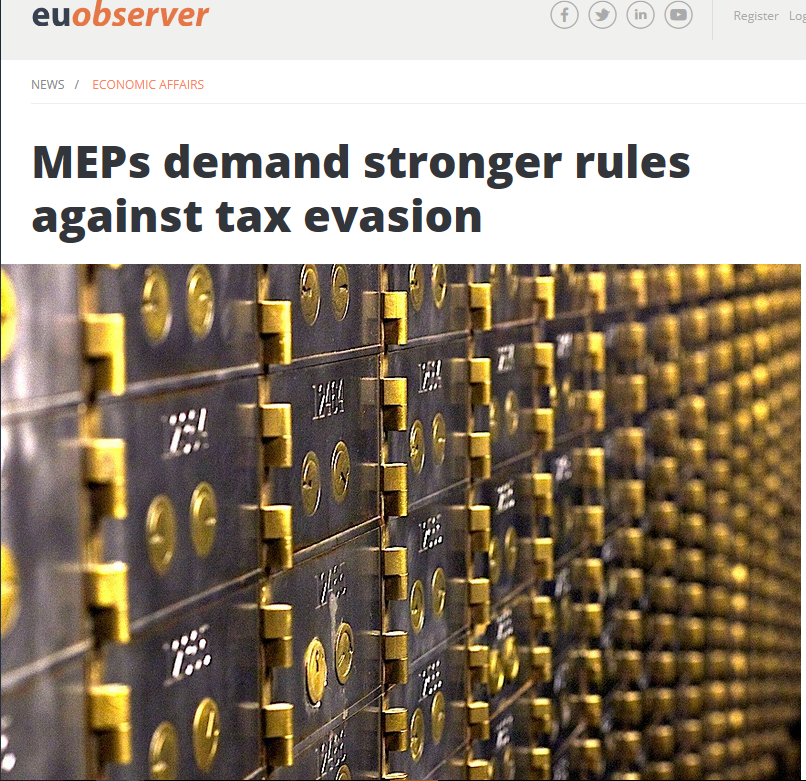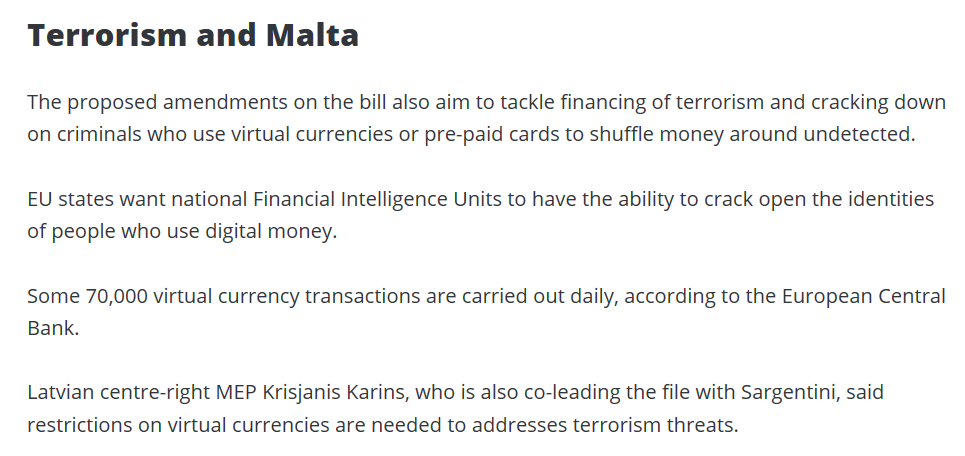Muscat says Europe should become a “bitcoin continent”, as the EU fights against the rise of money-laundering and terrorism financing through bitcoins
The EU Observer has published an article today on contentious efforts for clarity in ownership of trusts and other ‘tax avoidance/evasion’ vehicles in Europe.
The second half of the article is boldly titled ‘Terrorism and Malta’, and is about the pressing need to crack down on the financing of terrorism and on criminals who use virtual currencies to move money around undetected.
EU member states are pressing for their national financial intelligence units to be given the ability to hunt down the identity of those who use digital money, like bitcoins. The European Central Bank says that around 70,000 transactions in digital money take place every day, with a strong risk that these are money movements which launder the proceeds of crime or finance terrorism.
The EU Observer reports:
MEPs launched an inquiry committee in the wake of the Panama Papers scandal to investigate abuse throughout EU states.
Some of those named in the leaks included Malta’s prime minister’s chief-of-staff Keith Schembri.
MEPs in the inquiry visited the country last week to probe tax evasions schemes but were denied a meeting with Schembri.
With Malta at the helm of the EU’s rotating six month presidency, some have cast doubt on its commitment towards a strong EU anti-money laundering directive.
Malta’s prime minister has put the country completely at odds with the rest of the European Union by suggesting, during a keynote speech at an event called the Ideas Lab, organised by the Centre for European Policy Studies, in Brussels a week ago, that “Europe should become a bitcoin continent”. That suggestion was met with consternation in Brussels circles which has not been reported in the Maltese press.
To make matters profoundly worse, Joseph Muscat travelled to Brussels to announce that Europe should become a “bitcoin continent” accompanied by the Governor of the Central Bank of Malta, former Labour Party president Mario Vella – a significant fact that went unregistered in the press and which I know only because a friend happened to be on the same flight. My friend wondered what they were doing together, then the next day I read that Muscat had given a speech about bitcoins and connected the two.
When I read the actual text of his speech rather than what was reported in the newspapers – you can read it here: Joseph Muscat’s bitcoin speech – I was taken aback. It has that hallmark 1970s sixth-former sound about it, with expressions like “outright insane” and “beautiful minds” that belong nowhere around a prime minister or a central bank governor.
I suddenly realised that here we have a situation in which the governor of the central bank of a European Union member state, and its prime minister, are arguing for the rise, growth and promotion of crypto-currencies, which will give enormous advantages to money-launderers, terrorists and other forms of organised crime. This did not come of nowhere. Like everything else Muscat and those connected to him do, there is an invariably an agenda to their personal advantage, dressed up as being of benefit to Malta or the European Union.
It is especially unfortunate that Malta’s prime minister is arguing for crypto-currencies (when the European Union is moving against them) at a time when he and those most closely connected to him have been implicated so heavily in the Panama Papers scandal, with the suspicion of crimes involving corruption and money-laundering hanging heavily over them.
“I was strongly urged to deliver a well-prepared, diplomatically articulated, and strategically balanced speech, which I can assure you would have bored you to death,” Prime Minister Muscat told his audience. “Instead, I have chosen to try to get into the spirit of this event by proposing ideas, some sensible, others risky, yet others which might sound, and be, outright insane.
“I will not speak here as Prime Minister of the Member State holding the Presidency of the Council of the European Union, that is a very important caveat for me, but as a European who is fed up of us going round in circles, and of someone who wants to provoke debate. Europe should become the bitcoin continent.”
He went on to add, after dismissing the euro: “Some financial institutions are painstakingly accepting the fact that the system at the back of such transactions is much more efficient and transparent than the classical ones. My point
is that rather than resist, European regulators should innovate and create mechanisms in which to regulate crypto currencies, in order to harness their potential and better protect consumers, while making Europe the natural home of innovators.”
Muscat moved on from bitcoins to argue for EU citizenship as a marketable commodity or “innovative policy tool”, saying: “This is, I admit, controversial. But it is also something I passionately believe in. When Malta introduced an innovative Citizenship by Investment programme in 2014, we were sneered upon (sic) by many. I realise that the mainstream concept of citizenship is as conservative as it might get, even to some of the most liberal minds I know.
“Speaking with the benefit of experience, I can say that citizenship can be one of the most innovative policy tools for any European Union member state. At a time when so much talent, so many beautiful minds are looking for a new home, citizenship is one key attraction that can make Europe unbeatable in the global race of the future. Well, even if Europe does not take this up, we have already done so and intend on perfecting this approach.”
Interestingly, in saying that, Muscat positions Malta as something apart from Europe, while at the same time being able to sell access to it precisely because it is part of Europe.
Something tells me that after the general election, if these people win a second term in government, Malta is set to become the bitcoin money-laundering capital of this part of the world – and that the preparations are already being made for it. And that whoever has a vested interest in the heightened use of cryptocurrencies is already funnelling money into the Labour Party and a couple of Panama companies, and calling the shots.
We saw the exact same thing before the last general election, but it wasn’t clear to many, most of whom actually thought that a new power station, for example, was a valid electoral proposal rather than something quite other. With the benefit of experience, we now know what to watch out for.


